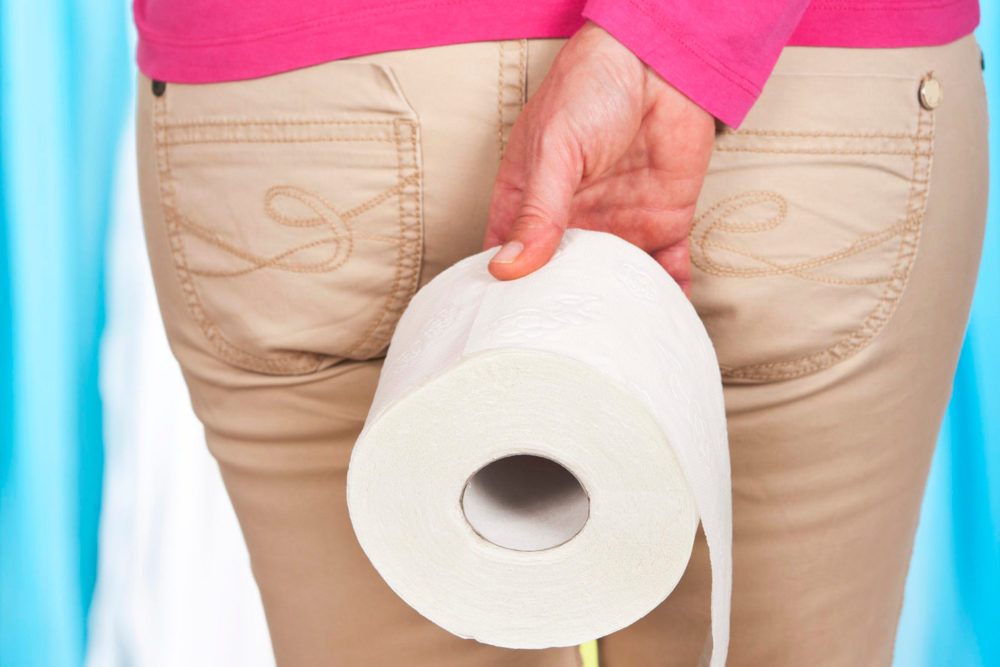
I get a lot of questions about celiac disease from friends, families, and even strangers (hello, waiters!). In this post, I reveal the 12 questions I’m asked most about celiac disease. Some might be a bit TMI (too much information), but if you’re reading this article, I suspect you’re curious too. Please note this post contains affiliate links. Please read my disclosures.
I’m always asked a lot of questions about celiac disease, after all, it’s a big part of my life.
I love to eat, cook and socialize (and all socializing involves food, right?), and I enjoy a career as an author, gluten-free blogger, and nutrition and health coach. My personal life and my professional life revolve around celiac disease and the gluten-free diet.
Naturally, people are curious about celiac disease. They want to know what I’m eating, what happens when I get accidentally glutened, and if I’m going to die from celiac disease.
I get the same questions over and over again.
While I don’t mind answering such questions, I figured I could make it easier on us all by answering them in this post.
Please know that I love when people want to learn about celiac disease. Knowledge is understanding. The more people who know about celiac disease, the more people will know what symptoms to look for (maybe they or a loved one has celiac disease), and most of all, the more people will be more sensitive and understanding to the plight of a person with celiac disease.
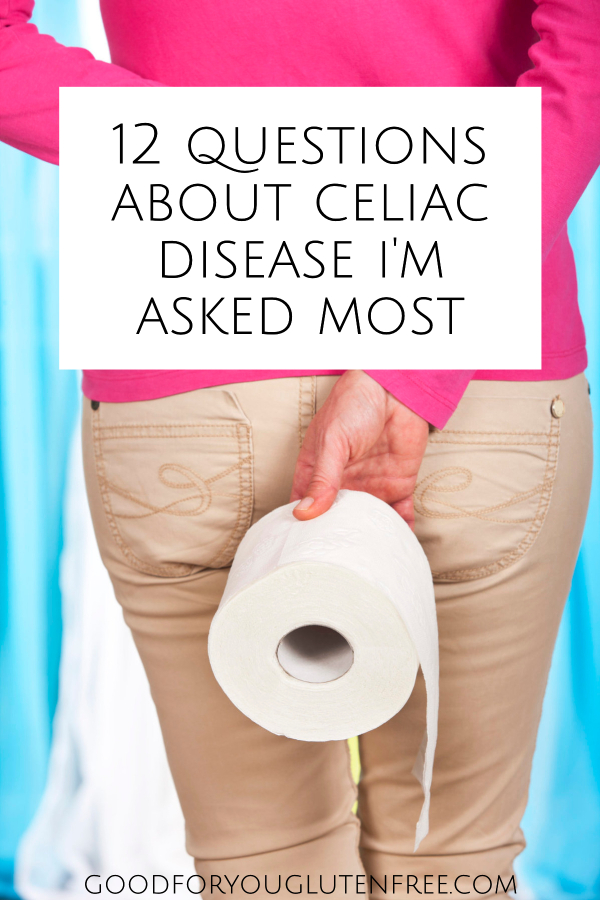
1. What happens when you eat gluten?
This is the top question I get because, naturally, people are curious.
They want to know if I break out in a celiac rash, go into anaphylactic shock, or have diarrhea all day and night. (That would suck, right?)
The truth is I get sick. Really sick. Usually, about one hour after eating gluten, I have to go to the bathroom urgently. I experience bloating and intense cramping in my abdomen. After some toilet time, I feel much better.
I’ve affectionately described gluten episodes in the bathroom as going “number three” vs. number two — get it? (If you don’t get it, send me an email, and I’ll explain.) Thank goodness I only get accidentally glutened a few times per year. I’m really careful about what I eat.
Keep in mind that every person with celiac disease reacts differently when they are glutened.
I know many people who are asymptomatic or have silent celiac. They don’t even know if they’ve been glutened. Others, however, are not so lucky and have an immediate, visceral reaction.
What you should also know is that when I accidentally eat gluten, there is more going on inside of me than meets the eye.
Celiac disease is an autoimmune disease. This means my body goes into attack mode when it’s triggered by gluten. My immune system attacks the healthy tissue surrounding my small intestine, chipping away at my good health and making it difficult for me to properly absorb nutrients from the food I eat.
The more I eat gluten, whether on purpose or by mistake, the more it deteriorates my health and puts me at risk for accumulating other autoimmune diseases, cancer, and early death.
2. Why do you insist your food never touches gluten?
Even a crumb of gluten is not okay for someone with celiac disease to eat, and it’s not safe for someone with gluten sensitivity, either. A small amount of gluten can set off an inflammatory fire inside my body and destroy the lining of my small intestine.
This means that if you give me a burger with a bun, I cannot just remove the bun and eat the burger because it has already touched gluten and, therefore, contains gluten.
It’s also why I can’t eat fries, which are naturally gluten-free if they’re cooked in a shared deep fryer that was also used for cooking breaded chicken nuggets. Any sort of cross-contamination can be harmful to my health.
Also, I can’t remove the croutons from my salad either, toast my gluten-free bread in any old toaster, or cook gluten-free waffles in a waffle iron used to cook regular waffles. There’s just too much risk of gluten bits getting into my food. In other words, I can’t eat anything that has come into contact with gluten.
3. How do you live without sandwiches?
This is my favorite question… mainly because it’s a bit absurd.
The Standard American Diet (SAD for short) dictates that lunch be a sandwich, but my gluten-free diet dictates otherwise. I rarely eat sandwiches, and prefer salads, stir-fry bowls, sushi, leftovers from last night’s dinner, lettuce-wrapped burgers, or BFree wraps.
There are so many options we can eat for lunch… and we most definitely need to think outside of the breadbox.

4. Are there any good gluten-free bread brands?
Ah, the bread question again! I get it a lot.
I say if you will eat gluten-free bread, make sure it’s a good one. There is a lot of icky, sand-like tasting gluten-free bread out there.
One of my favorite bread brands is Canyon Bakehouse (in the stay-fresh packaging). I also like BFree, Schar, and Three Bakers.
BFree has a Homestyle Sourdough loaf that is reminiscent of Wonder Bread. It’s soft and squishy and doesn’t need to be frozen.

A really good gluten-free sourdough bread option is Bread Srsly, which you can order online. Please note regular sourdough bread is not gluten-free. Only sourdough bread made with gluten-free grains is gluten-free and safe. (And I have a wonderful gluten-free sourdough recipe on my website.)
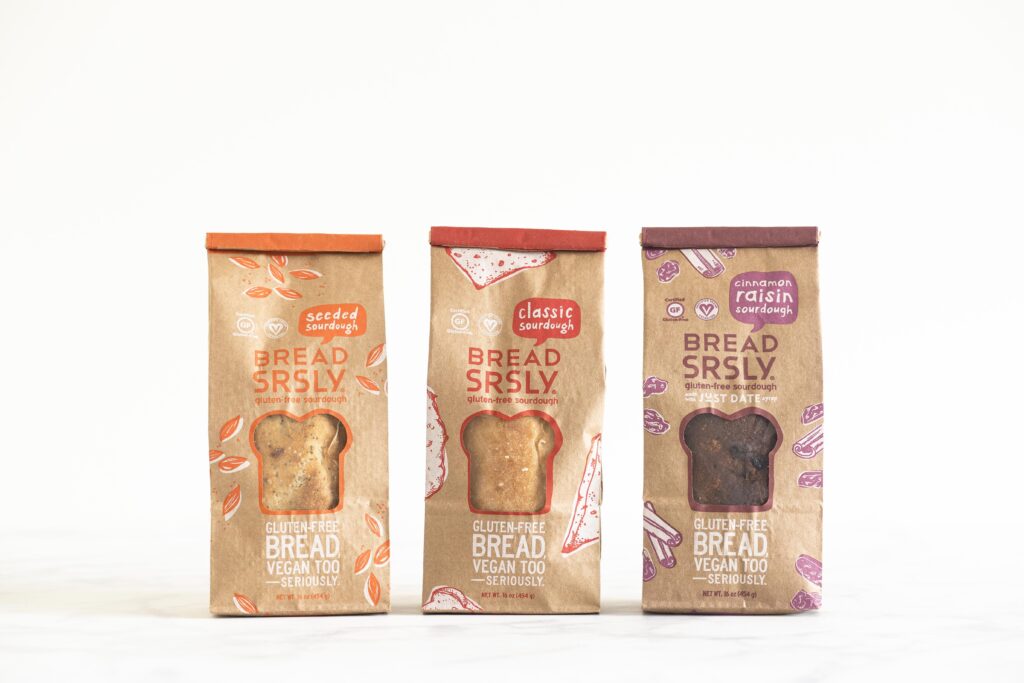
Gluten-free bread is definitely better heated (if possible). Unfortunately, the gluten protein makes regular bread soft, doughy, and chewy. Gluten comes from the Latin word that means “glue.” Without it, your bread isn’t the same.
You can also make your own loaf of gluten-free bread with my simple recipe or try this amazing gluten-free bread mix.
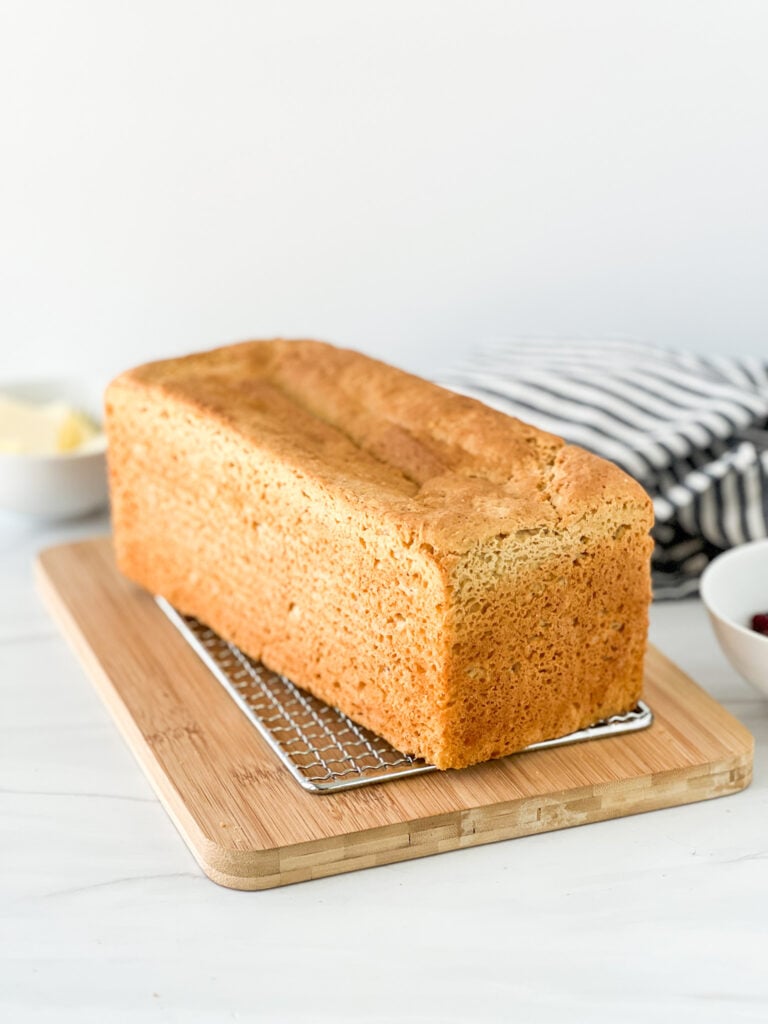
5. Can you really eat out safely?
Eating out while following a strict gluten-free diet is challenging. Remember, I can’t just take the bun off my burger… my burger can’t even touch the bun!
That said, I find that eating out is possible with a few precautions and hacks.
First, it’s essential to eat as naturally gluten-free as possible when eating out. A burger is more likely to be prepared safely than a gluten-free waffle or pizza, which likely uses shared mixing bowls, ovens, and cooking utensils to prepare.
Second, it’s essential to research a restaurant ahead of time, ask your server lots of questions, read reviews on the Find Me Gluten Free app, and talk to other gluten-free eaters to see where they have safely enjoyed a meal out.
Third, I always take my Nima Sensor with me. When in doubt, I test my food for gluten so I can know with some degree of certainty if my food is or isn’t gluten-free. (Please note that I no longer use Nima Sensor; the company is out of business.)
Believe it or not, many chain restaurants do gluten-free well – Chili’s, Red Robin, Five Guys, Chipotle, and even Caribou Coffee have safely wrapped gluten-free breakfast sandwiches.
California Pizza Kitchen offers certified gluten-free pizza, so its staff has been trained to serve people with celiac disease.
I’ve written extensively about how to eat out safely while on a gluten-free diet in my popular ebook, The Ultimate Guide to Eating Out Gluten Free. I also write extensively about eating out safely in my book, Dear Gluten, It’s Not Me, It’s You.
6. Are you allergic to gluten?
You cannot technically be allergic to gluten because gluten, a protein found in wheat, rye, and barley, is not a recognized allergen, but you can be allergic to wheat, have gluten sensitivity, or have celiac disease.
No, I’m not allergic to gluten, but I do have celiac disease, an autoimmune disease that affects about 1-3 percent of the U.S. population. When I eat gluten, my body launches an attack on the lining of my small intestine, which prevents me from properly digesting and absorbing food.
People who are sensitive to gluten experience inflammation and discomfort when they eat gluten. Gluten sensitivities affect about 18 million people in the U.S., which should be treated with the utmost care. Unmanaged diseases turn into other – often more serious – diseases.
You can read more about the similarities and differences between gluten sensitivity and celiac disease in this article.
7. Can you tell if something is gluten-free by looking at it?
Unfortunately, it’s really hard to tell if something is gluten-free just by looking at it.
While gluten is a protein found in wheat, barley, and rye, it doesn’t always look like a slice of bread or pizza.
Foods such as soy sauce, which doesn’t look like it contains gluten, actually contain a lot of gluten (wheat). Licorice also contains wheat flour, yet it looks gluten-free.
I’ve written extensively about these common surprise products that contain hidden gluten. While I can’t tell if something is gluten-free just by looking at it, I can usually determine whether gluten-free ingredients were used and whether the food was prepared in a gluten-free-friendly manner by decoding the food label.
8. What’s the difference between gluten-free and certified gluten-free?
There are many products on the market today bearing different labels, making it tricky to determine which are gluten-free. Some products are certified gluten-free by the GFCO and other organizations, while others are simply labeled “gluten-free.”
If you eat gluten-free, there is a difference between the two labels that you must understand.
Products that are certified gluten-free have been verified to be gluten-free by a third-party agency, typically the Gluten-Free Certification Group (GFCO).
The GFCO, for example, requires products bearing its official GF seal to contain less than 10 ppm of gluten vs. 20 ppm that the FDA legally requires a company to comply with to be accurately labeled “gluten-free.”
Companies pay for third-party certifications, which can be expensive and deter some companies from doing it. However, the certification does instill an added level of confidence.
On the other hand, products labeled “gluten-free” (not certified gluten-free) must contain less than 20 ppm of gluten, according to FDA regulations, and these companies self-certify themselves.
This means there is no third-party verification process that verifies if the manufacturers’ claims are truthful; rather, if a product makes a consumer sick, it should be reported immediately to the FDA for investigation.
Please note that a gluten-free certification does not mean a product is produced on dedicated equipment or a dedicated gluten-free facility. In fact, many certified gluten-free products are made on either shared equipment or shared facilities. (Read: Certified Gluten-Free, but Made on Shared Equipment – Huh?)
Products that do not contain any gluten-free label also may be considered free from gluten; however, it typically means the manufacturer is unsure if the product is gluten-free and doesn’t want to say as much.
For example, a spice might only contain one ingredient, such as ground garlic, but it might not be labeled gluten-free. This may mean the spice manufacturer is unsure if the raw ingredients used contained or came in contact with gluten and, therefore, doesn’t want to make such a definitive claim. (Read more about hidden gluten in spices.)
Some products have allergen disclosure statements that can confuse those following a gluten-free diet. For example, the disclosure may say, “Manufactured in a facility that manufactures wheat” or “made on the same equipment as products containing wheat.”
I would avoid products made on the same equipment as wheat that are not certified gluten-free; however, if a product is certified gluten-free, I’m okay with it being made on shared equipment. If you have a true wheat allergy, you should avoid such products. Read more about how to decode confusing labels for hidden gluten in this article.
9. Is it hard to be gluten-free?
Yes. It’s quite challenging.
Many people say, “But it’s so much easier to be gluten-free today.” While I understand what they’re saying, putting “easy” in the same sentence as “gluten-free” is not something someone with celiac disease would ever do. #thestruggleisreal
While a gluten-free diet is never easy, it does get easier with time, especially as you become an avid label reader, find trusted restaurants, and master the art of making delicious gluten-free meals.
If you need help coming up with gluten-free foods to eat every day, I encourage you to download one of my gluten-free meal planning packs.
10. Can you die from celiac disease?
Yes, you can die from celiac disease; however, it’s not an immediate death.
An autoimmune disease slowly chips away at your health. When unmanaged, autoimmune diseases turn into more autoimmune diseases and even more serious diseases like cancer, diabetes, and Alzheimer’s.
I prefer to manage my disease as much as I can (at least what I can control) to give me the best shot at living a long, disease-free life. If that means I have to order a gluten-free meal when I’m in a nursing home, so be it. (Read: How I Healed Myself from Celiac Disease.)
On another note, those with gluten sensitivity have a higher early death rate than those with celiac disease, mainly because many people with “just” a gluten sensitivity don’t take their diet as seriously as someone with celiac disease.
There are serious consequences to continuing to eat gluten if you have a gluten sensitivity or celiac disease, which you can read about in this article, Don’t Cheat on Your Gluten-Free Diet.
11. How did you find out you have celiac disease?
I was officially diagnosed through a blood test, and my diagnosis was later confirmed with an endoscopy procedure to biopsy my small intestine.
I had previously discussed my painful bloating and chronic gas with my doctor, and she had the wherewithal to test me for celiac disease. I didn’t even know she was testing me for it – but alas – she did, and I’m thankful!
If you suspect you have celiac disease, ask your doctor to test you, or order this simple at-home celiac test to test yourself in the privacy of your own home.
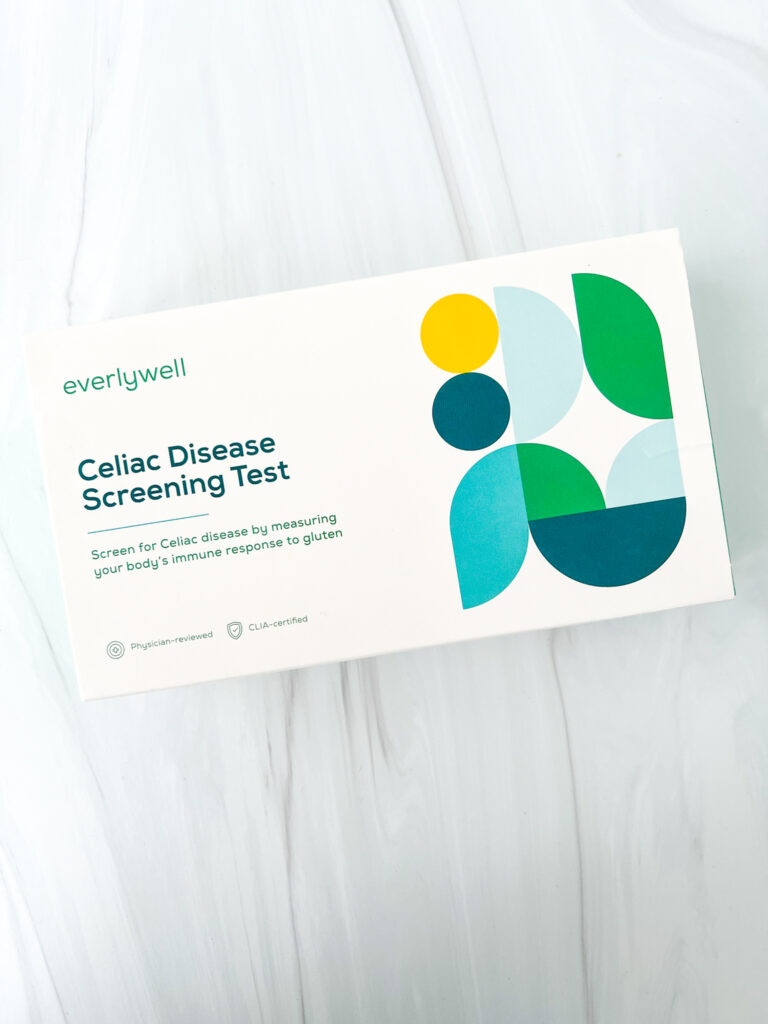
While the GI symptoms are what prompted me to discuss my health concerns with my doctor, the truth is I had many unexplained ailments that plagued me my entire life that I thought were no big deal.
I suffered from occasional but painful migraines, red bumps up and down my arms, geographic tongue and cold sores, feeling lightheaded and shaky between meals, low iron levels, etc. All of these things cleared up after I started eating strictly gluten-free.
If only doctors knew to look for celiac disease sooner, or we had better early detection methods in place, we might be able to prevent more serious conditions from developing.
12. Do you have to eat gluten-free if you don’t have celiac disease?
People follow a gluten-free diet for a variety of reasons. If you have celiac disease, a gluten-free diet is a must. The same goes for those with non-celiac gluten sensitivity.
While gluten sensitivity is not as understood or researched as a disorder, it’s a real disorder affecting millions of people every day. The only treatment for gluten sensitivity is a strict gluten-free diet.
Remember, nobody is following a strict gluten-free diet for fun. Many of my gluten-sensitive friends have a worse reaction to gluten than me. The only people who eat gluten-free that I know of do it to feel better or for medically necessary reasons.
Missed Questions?
In this article, I answered the 12 questions about celiac disease I get the most. Now it’s your turn.
What questions do you have? Or if you have celiac disease or gluten intolerance, what questions are you asked most? Please leave a comment to share.
Additional Reading
- Dear Gluten, It’s Not Me, It’s You (my book)
- Can Celiac Disease Kill You?
- 10 Facts Your Doctor Doesn’t Know about Celiac Disease and Gluten Sensitivities
- 21 Struggles Only Gluten-Free People Will Understand
- 10 Mistakes You’re Making to Sabotage Your Gluten-Free Diet
- Supplements for Celiac Disease and Gluten Intolerance
I was diagnosed 13 years ago at age 58. I had been severely anemic for years and my thyroid was gone from hashimotos disease. My thyroid dose was increasing because I wasn’t absorbing it. My endocrinologist made me go to a gastroenterologist. When I told him how anemic I was, he said I’m 99% sure you have celiac disease. A blood test confirmed it and then endoscopy proved it. His advice: quit eating gluten. No nutritionist, nothing. Look it up online. So I did. Thought I was doing pretty well. About 4 months in, the joint inflammation and pain eased, but I was plagued with brain fog. I thought I was getting alzheimers. I found this recipe for muffins in a reader’s digest. It was from a book called wheat belly diet, written by a cardiologist. Basically said that grains could affect people the same as gluten. So I got the book, went grain free, gluten free. About a month later, I could see the difference. No more fog. Haven’t eaten grains since. Bit of a challenge, but a lot of foods are made grain free and gluten free now. Grain free tortillas, yay, grain free chips like corn chips. Grain free cookies. Thank you, Siete foods and Simple Mills. Lots of chips are free too, read labels. Lots of fruit and veggies and meat and nuts. If you’re new to celiac, shop for only whole foods at first. Good rule of thumb is shop the outer aisles of the store. Always a challenge. But my health is worth it.
I was diagnosed with Celiac when I was 51 years old. It explained a lot of things in my life that is for sure. It came about through normal blood work, that detected that I had zero level of IRON. So, from there I had a colonoscopy. That showed up clear, so they put me back under a week later and did an endoscopy…..THAT WAS IT!!!! From there I was sent to a nutritionist who was better that the gastroenterologist (who just told me not to eat wheat and then sent me to the nutritionist)
I have lived gluten free ever since, by the way, I never heard of Celiac Disease before so it was all new to me.
It has been quite the journey for sure, certainly not one I would EVER choose. But, the restricted diet is well worth it, I only wish I knew a whole lot earlier because now I am 64 and I have very bad bone density and it is a bad thing to have as you age.
I get violently sick within 20 minutes to an hour from ingesting gluten, I can be vomiting for over an hour and feel totally wiped out for a whole day or more. So often I will forgo eating out especially if I am not sure. It is so not worth it at all.
Jen from Pennsylvania
The biggest issue I have is understanding. I have suffered for over 20 years with gluten sensitivity, and pretty severely as well, but when tested for celiac it came back negative. There is cross contamination all over my house and I don’t know that I could convince my husband to do any different without a celiac dosage.
I just want to feel better. I am not consuming gluten products but am cross contaminating and am wondering how much of a difference it will make. Any advice?
I was diagnosed with celiac about 6 weeks ago. It has been a struggle getting my health and ailments better. Even going completely gluten free, I have still struggled with gas, bloating, cramping, headaches, and joint aches. I recently started the FODMAP diet as well, which is seeming to help (still a slow process!). Hopefully, I will only need to do this for a few weeks. Also, this last January, I suffered a mid-term stillbirth at 5 1/2 months. Miscarriages are fairly common with undiagnosed celiacs. Since we don’t know when the “on switch” is triggered, there is not a way to know when I developed it. The thought is it possibly happened when I was pregnant with my daughter, who is now 3 years old. Then the recent pregnancy loss was a result of not knowing that I had an autoimmune disease. So many things I never knew before learning about celiac. Thank you for sharing your experiences, your tips and tricks, and being an awareness advocate.
My son 36 has Down Syndrome and has been diagnosed with Celiac Disease 2 years ago by blood tests and biopsy. It has been quite a journey. But, our whole family gluten free now. It is easier than making two kinds of everything!
Glad you asked. You really should have a gf communion wafer for the sake of your health. Be well friend.
I had a lady (nurse) ask me ” now is it really necessary that you have a gluten free wafer at communion”. Sorry but yes it is. I was getting cramps sometime after communion so I ask the church to get GF wafers. What a difference. I’ve had the gluten problem for several years now but just this year finally ask for the GF wafers. It’s not a fun thing especially when ask all the time where can you eat. You usually find something on a menu or eat at home most of the time.
I loved reading this site. I have intolerance and people say all these things. A check out gal said, when she saw my groceries….isn’t that in you head. If you were at my house, you would see it definitely is NOT in my head..Yes it is difficult to change your whole lifestyle, but more that worth it. I, too, have suffered as long as I can remember from bouts of horrible stomach trouble…and even though I am careful I still have bouts and many times you do not know where you got glutened. You just wait for the storm to pass. I also was diagnosed with dairy allergies. Double trouble.
I was tested as I have had my unexplained problems for years. One blood test came back possitive and one negative. So they did and endoscopy with no conclusive results as I had no inflammation. They did then run the genetic test and it was possitive. I had what they thought was an intestinal infection 4 years ago but my neurologist thinks it was a flare up that set it in motion. Yeah going gluten free is definelty not easy. I have been a picky eater all my life so some days is a real struggle. Really a downer when you thought you had been doing good and find out something else had gluten in it that you missed. Just keep trucking on….and #3 is a real thing!
I love that last one.. .I got asked the other day while checking out at the supermarket if I was on gluten free diet to lose weight? Really? I have found that most gluten free replacements are higher in calories and fatt han the original. Kinda made me feel crappy, like playing down my sensitivity and calling me fat at the same time..thanks ☹️
I hate when people tell me it’s in my head. Grrrr!!
Yes! Exactly! Just something that has touched something containing gluten can make you sick. I am gluten sensitive and it’s difficult when people think it’s nonsense or just a trend. When I told my best friend that I can’t eat even a small amount of gluten, not even something that has been cooked next to gluten (the non gluten filling inside a gluten pie crust for example) she said “Maybe it’s all in your head then.” Very few people I know actually believe it’s a real thing, it can be very frustrating! This was a great read, thank you!
That’s a good one. People just can’t seem to comprehend life without gluten. Thanks for sharing!
A question I get frequently when people find out that I have celiac is “What do you eat?” I have a very hard time answering that question. It’s like they are expecting some strange meal plan.
So many great recipes here. Try the tacos, sloppy joes, stirfrys, etc. also go to your local library and check out cookbooks 🙂
My 5 year old daughter was diagnosed with Celiac disease earlier this year. It’s definitely been a difficult road for her, especially since she’s picky to begin with. It’s hard to find GF recipes that cater to young children because I think it’s more common in adults than kids. Do you have any suggestions?
It means you could have or develop celiac disease in your lifetime. It’s a predisposition but not a diagnosis. Ask your doctor to do a celiac blood test. Good luck.
Hello,
I have always had horrible stomach issues. Diarrhea 70% of the time. Recently I bought the 23 and me test. It came back that I have both Gene’s that may give you celiac disease. What do you think about this.
You be strong Celeste. People poke fun at what they do not understand or don’t have the willpower to do themselves. Interesting thought about the acid inhibitor. They do limit stomach acid therefore teaching your body not to properly digest food. Hopefully you’re feeling better without the gluten!!
I developed a gluten sensitivity at the age of 66.. I think it was from being on an acid inhibitor for a long time. Anyway, I get the most flack from my family who do not understand it at all. I feel like I should have lied and said I was diagnosed with Celiac. I do have three cousins with celiac so I love being with them.
My daughter has celiac disease, we enjoyed reading this today. Thank you for sharing your story! People ask her why she has celiac disease and she doesn’t know what to say (she is 9 yrs old)…:(
Thank you for responding, I will look at the Nima sensor it seems really helpful especially when you cant be sure out and about. I do miss being able to eat everything but this lifestyle change has caused me to eat a little healthier. My pregnancy was successful, we had a baby girl she’s wonderful, thank you. I would like to know whether or not I have it but debating when I should test as I’m currently breastfeeding and since my daughter has never come in contact with the gluten protein I don’t want to mess with her system. I am glad it’s only a month or so, I have been told it was 6 months but I can do a month of gluten, eat all the things I miss one last time. My husband is military so I am not sure about seeing a GI doctor right away, it’s always more complicated through them but I will talk to my doctor. Thank you for the advice and the article also your recipes look good I will have to give some a try!
Hi Kym: It’s generally recommended that you get tested for celiac disease before going gluten-free, as it’s difficult for blood tests and even biopsies to pick up intestinal damage unless you’re actively eating gluten. Your options are to go back on gluten for 1-2 months and then get tested, or simply not worry about it at this point (because if gluten makes you that sick, it would be really hard to go back on it). The benefits of knowing if you’re positive for celiac is that if there is every a treatment, you would qualify for it. It also helps with stats and research/funding $$ – so it’s important to get a diagnosis, but it’s not important to go back on gluten and make yourself sick! I would definitely talk about this with a skilled GI doctor, perhaps someone who specializes in celiac disease and gut issues (and perhaps has a functional medicine background too). I got the Nima Sensor Starter Kit at NimaSensor.com. If you order one in July, use my coupon code GOODFORYOU to get $50 off. (My coupon code changes back to $15 off in August). Nima has been a lifesaver. It saved me a few weeks ago from eating a pancake that had gluten in it. I was at a brunch restaurant. I would have been so sick, like you, if I had eaten it. Let me know if I can help you further! Glad you’re feeling better (and good luck with your pregnancy!)
Jenny I haven’t been tested but gave up gluten over a year ago due to having many symptoms that matched gluten intolerance. They were, migraines, daily headaches, heartburn, multiple miscarriages, digestive issues. Also after giving it up I finally stayed pregnant something I didn’t think was possible. During this year i accidentally ate gluten as crumbs and got so sick for 24 hours I couldn’t function normally. With your knowledge and experience do you think I should be tested, I have had the blood test done and they said it was negative. Also where did you get the tester, I have never seen that before. Thank you and great article!